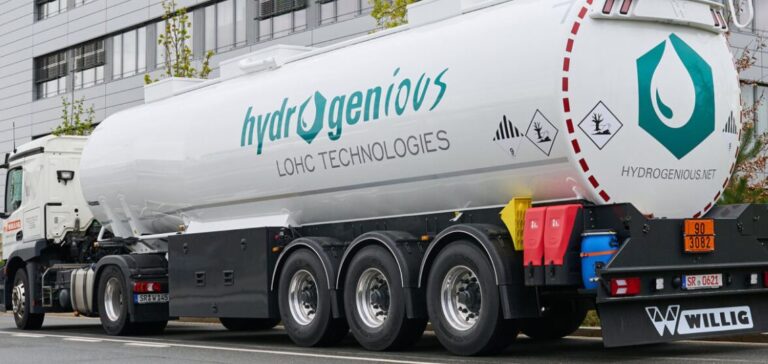Hydrogenious LOHC and Evos announce to develop hydrogen import facilities in the port of Amsterdam. This announcement comes during the European Hydrogen Week.
A strategic port area
Hydrogenious LOHC, Evos and the Port of Amsterdam sign a Memorandum of Understanding to develop hydrogen imports into the port area. All three parties are founding members of the H2A platform. The platform focuses on developing supply chains for renewable hydrogen imports, via the port of Amsterdam.
The facilities will include a Hydrogenious LOHC dehydrogenation plant with a capacity ranging from 100 to 550 tons per day. Thus, in total, the volumes treated will be at least 1 million tons per year. The goal is to have the first hydrogen deliveries to local buyers in service before 2028.
A unique and reliable project
The liquid organic hydrogen carrier used by Hydrogenious LOHC is benzyl toluene thermal oil (LOHC-BT). The liquid is non-flammable and non-explosive and has ideal properties for safe handling in ports. Thus, benzyl toluene can be handled as a liquid fossil fuel in existing infrastructures, at ambient pressure and temperature.
After dehydrogenation, it can be reused several hundred times to bind hydrogen. Dr. Daniel Teichmann, founder and CEO of Hydrogenious LOHC, states:
“In order to achieve Europe’s ambitious plans to import 10 million tons of hydrogen already in 2030, we need to use existing infrastructure. Therefore, the H2A consortium focused on LOHC technology that can build on existing oil processing and storage capacities and significantly reduce the potential risks of handling molecular hydrogen or other derivatives. For a port and industrial region like the Port of Amsterdam, which is located very close to the city, this is of paramount importance. The establishment of LOHC-based supply chains will also facilitate the transport of hydrogen to the “hinterland” and to Germany. In addition to developing import projects, H2A will also provide policy and regulatory support for technology companies and project developers there, as well as structured access to financing.”
Thus, Evos’ terminals in Amsterdam need only minor modifications to store and distribute LOHC.






















